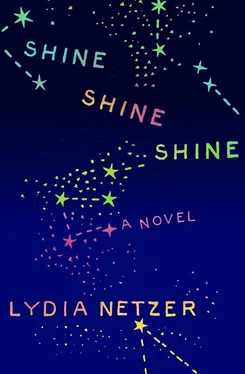She had certainly never heard him laugh like that. It was almost frightening. Yet she remembered that when he was a baby, there was a full belly laugh that used to make them all laugh; it was so confusing and erupted from him. She watched his stomach convulse as he rolled on the floor. She should help him, but the extremity of it impressed her, alarmed her. What is laughter but a manageable convulsion? What is crying but a mild seizure? Drugged, he could fake it, he could learn to produce crying, laughing. What’s the difference between a real laugh and a forced one? If it can be controlled, must it be fake? Maybe the difference between the believable emotional expression and the unbelievable one could be the ability or lack thereof to reproduce it. Was that fair? He sat up when he saw her, and gasping, he said, “Mom, look. It’s a robot.” The guinea pig moved in jerks, from crude animation and fat pig parts. She sat down on the ottoman, and Bubber backed up against her knees. She put her hand on his head and felt it was damp, he had been laughing so hard. His face was slack, relaxed, his eyes clear. Sunny thought, Wow, this is my little boy. This is him, he laughs hysterically. She felt exhilarated. What else could he do?
“Are you bald? Losing your hair?” said the television. Sunny clutched Bubber’s ears, covering them with her hands. Her eyes locked on the screen. “There’s no need to suffer the embarrassment of hair loss and no need to destroy yourself with harmful chemicals. Dr. Chandrasekhar’s Orchid Cure can restore your hair and your self-esteem with all-natural plant extracts.” Up until now, the screen had shown a waterfall splashing into a rock-lined pool. Around the pool sat women in traditional Burmese attire, with long glorious hair falling down to their knees. The women themselves were not Burmese; they were blond, redheaded, and brunette. They stroked and stroked their hair, arranging it with orchids and vines. “I’m Dr. Chandrasekhar,” said the TV, and a disembodied head appeared in the middle of the waterfall. It was an elderly Indian man, pleasantly mustached and wearing a lab coat. “I have developed my Orchid Cure formula for thirty years, to bring you the finest Eastern herbs and…” He went on talking, but Sunny wasn’t listening. “He’s brown,” she said out loud. “He’s brown. He’s really Indian. He’s not my father. He’s brown. What happened to him? What happened?”
The rock that hit the rocket had been hiding behind the moon. It was only the size of a fist. Inside it, down deep in the core, surrounded by weird heavy metals and crystalline rock, was a drop of a substance so primitive it was unrecognizable. It would never be recognized. It was a bit of matter, a grain of dust from the beginning of the solar system itself. Presolar. A presolar particle, trapped in a rock in crazy orbit around the sun. It was one in a million, one in a hundred million, like a raging genius in the human race, or a crazed savant skipping outside the bell curve. The rocket, approaching lunar orbit, cut through the emptiness like a gleaming, nanomatronic sliver in an artery, so tiny, such a fragment of metal on its path. The meteor was even smaller, a rogue molecule, loose in extraterrestrial solution. A subliminal particle on the atom of the solar system. A bit of thought loose in the brain. The size of the meteor was judged, later, to be nine centimeters in diameter. They did not see it at all; nobody saw it on any electronic screen. The astronauts and Maxon had put on their space suits. They had strapped themselves down, in the control module, just like takeoff. Just like the moment when the tower of fuel under them had exploded, shooting them straight up, face-first, into the ozone. The babble of Mission Control in their ears had directed the astronauts through the checks, the tests, prior to their arrival. The storage pod was already orbiting the moon, so they would sync with it, if all the numbers were aligned properly. The voice of Mission Control, calm and calming, droned on down the procedure for initiating lunar-orbit insertion. When the procedure was finished, when they had fired the rocket again, they would be orbiting, too.
The meteoroid was close, getting closer, but still secret, undetected by the astronauts in space or the humans on Earth, who were operating the astronauts remotely. It was such a little one, though. It was a meteor that no one would notice or care about, if it were wrapped in a cozy blanket of Earth’s air. The atmosphere can burn up most things before they bother Earth. Yet in space, the smallest little thing moving at the correct velocity in the most dangerous direction can penetrate like a bullet. A grain of sand can leave a two-inch crater in the hull of a spaceship. What could a baseball do? It’s one thing when you walk outside, turn your face up, and say, “Wow, just look at all those stars.” It’s another when a hunk of metal from before time drives itself into your intestines.
The pilot of the rocket was named Tom Conrad and he was a lieutenant commander in the U.S. Air Force. He was an automated person, his moves dictated by a roomful of scientists in Texas, by a protocol, by a list of procedures. Favorite of Gompers, the commander, and vocal critic of Phillips, the engineer, Conrad was as effective a pilot as there was in the world. Maxon was the only civilian on board. Conrad, Phillips, Gompers, they were good guys, stand-up characters. Everyone is friends in space; a few little blobs of life in a vastness of cold death will always pal around together.
Maxon clicked on his face mask, clicked into his restraints, buckled down into the chair. He became one with the rocket, connected to it, part of the hardware, indistinguishable. He was no longer floating, no longer human. He was a smudge on the rocket, a little bit of flesh inside it. He heard his breathing, inside that shatterproof helmet, that flesh bucket. Outside the ringing in his ears, outside the noise of Mission Control, relaying instructions to the pilot, to the engineer, to the real astronauts, while Maxon had been told, so lovingly, so kindly, to sit tight. The men on the ground always talked to the astronauts as if they were children, performing dogs. They were an extension of humanity, a little finger of biology in the vast mechanical space. Overdirected. Overthought. Ultimately, so insignificant.
When the meteor struck, the voice in the radio had just said, “Okay, check.” Then there was a bump; it was felt by the astronauts as a ripple in the core of the rocket. There was nothing they could have done, on the fly, to override the program and violate the list of available alternatives. The thing had to impact. There was no such thing as an evasive maneuver. They felt it hit, they heard the metal groan, and they felt a lift, a sickening moment of lurch, like a car going fast over the top of a country hill. Then the rocket began to tilt, but they didn’t feel it. They were in it, part of it, connected to it, laced into it with nylon straps and boots.
They saw themselves go off course, humanity jiggered to the left, hard, and there was a hissing sound, and some of the lights on the control panel began to blink, and the pilot’s arms were moving quickly over buttons and dials, responding to the blinking, the information, like a spinning wheel on a sinking ship, going faster and faster. Maxon thought of dying in the same way that he thought of the spaceship imploding: ruining itself on itself, crushing like a can. The meteor was heavy metal. The skin of the rocket would not deflect it. There would be damage, but how much? Mission Control began to shriek. Like a parent whose child has run into the road. “Gompers? Status! George?” Then went silent.
The meteor had hit the rocket. There was no turning back. The people were inside the rocket and were strapped to the rocket. It’s very hard to survive a meteor strike, in space. Everyone had always known this. Playing the numbers, they bet that a meteor would not hit, because space is so big, and meteors are so small, and rockets take up very little of space. Like a boat on the ocean, trying to stay away from one other boat, except times a thousand, times a million. It was so safe.
Читать дальше









